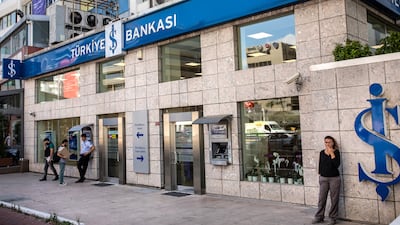As a young boy of five or six, I remember climbing into a friend’s car and seeing on the speedometer two parallel rows of numbers increasing at different rates and wondering which applied to the legal speed limit.
Following the passage of the Metric Conversion Act in 1975, US car makers led the switch by introducing kilometres per hour alongside miles per hour, apparently thinking that if drivers could get their heads around it, so too could America.
This reasonable yet ultimately futile US conversion popped into my head last week after Turkish Foreign Minister Mevlut Cavusoglu sent a letter to the UN requesting that the international body and all member states use “Türkiye as the new official name in English".
Unlike the American change, Turkey’s shift has nothing to do with its own people, who have called their homeland Türkiye since its 1923 founding. Instead, Ankara is attempting to alter the world’s view. It’s a bold move. Never before has a non-English-speaking country told the English-speaking world to say its name using characters with which that world is unfamiliar.
On the streets of Chicago, London, Mumbai, or Melbourne – global cities where English is an official language – only a vanishingly small number of locals would be able to explain what those two dots above the “u” in Türkiye mean or verbalise the sound they create. This will surely be an issue in terms of writing and printing the name. Already last week, a newspaper in New Zealand ran a story asserting that Turkey's new name was "Trkiye" – possibly because its printing press lacked an umlaut.
It’s also worth noting that Turkey is prone to taking linguistic liberties with other countries’ names. Did you know that, in Turkish, Greece is Yunanistan, Hungary is Macaristan, and Morocco is Fas?
Of course, the shift is far from unprecedented. In the past century, more than a dozen states have changed their names, usually as a shucking off of colonial influence: Persia to Iran; Siam to Thailand; Free Irish State to Ireland; Ceylon to Sri Lanka; Swaziland to Eswatini; Rhodesia to Zimbabwe and more.
Several states had their own unique reasons.
Macedonia became North Macedonia in 2019 to settle a dispute with its larger neighbour, Greece. In 2016, the Czech Republic shortened its name to Czechia for domestic and international usage. Even so, it hedged – Czechia is merely the shorter version; its official name remains Czech Republic.
Ukraine has not altered its country name, but since Russia annexed Crimea and initiated a conflict in the Donbas in 2014, its government has promoted the Ukrainian versions of its city names, such as Kyiv rather than Kiev, Odesa over Odessa and Lviv over Lvov. Since Russia launched a full-scale invasion in February, the world has more willingly embraced the change.
Two more recent name changes were, much like Turkey’s, about image. In early 2020, the Netherlands sought to move away from the seedy 1970s-90s Amsterdam the name Holland might evoke, and officially branded itself the Netherlands. Strangely enough, its official tourist website remains Holland.com.
A bit more dramatically, when Burma’s military junta changed the country’s name to Myanmar in 1989, it sought to wipe away the stain through which it had come to power – the brutal suppression of a pro-democracy movement – and gain international legitimacy. Much of the world has continued to use Burma.
That move, and Eswatini’s, were similar to Turkey’s in that they involved no change for native citizens. Additionally, foreigners often confused Swaziland with Switzerland. That’s one of the main things Turkey’s name change has going for it – confusion with the bird.
This is an annoyance with which Turkey watchers are all too familiar. Every November, my news updates are filled with innovations on turkey preparation, details on the wild turkey population of Pennsylvania, and which turkeys the American president plans to pardon.
In explaining the shift, Turkey’s state-run TRT cited the problem of the bird, though Turkish Airlines’ web editors apparently forgot about it when updating the mostly state-owned carrier’s online content. Last week, the description of an episode of Bob’s Burgers on THY’s in-flight entertainment had the animated family saving a country rather than a bird.
TRT also cited the Cambridge Dictionary’s definition of a turkey as “something that fails badly”, which seems another decent reason. The move, it should be noted, has not come out of the blue. It has been emerging, step by step, for some two and a half years, and dovetails with Turkey’s broader embrace of its centuries of civilisational achievement.
In January 2020, Turkish exporters announced that they would begin using “Made in Türkiye” on all their labels. Last December, Turkish President Recep Tayyip Erdogan ordered that “Türkiye” be used much more broadly, to strengthen the country’s brand and preserve the values of the Turkish nation’s deep-rooted history.
OK, but does that matter if nobody knows how to say it?
The UN embraced the change upon receipt of last week’s letter, but it’s unlikely to be so swift and simple for the rest of the world. The government of Turkey has every right to tell foreigners how it would like them to say its country name. But getting the world to actually listen and implement the suggestion is a steeper mountain to climb.
The US faced a similar problem decades ago, as a movement sprang up against its embrace of the metric system. Congressman Charles Grassley said the forced conversion “goes against our democratic principles”, while author Tom Wolfe, at an anti-metric party, vowed that US measurements not be determined by the French.
In the early 1980s, after millions of dollars had been spent on promoting the switch, the effort was quietly abandoned. Today all that remains is a desolate stretch of highway from Tucson to the Mexican border with road signs in kilometres.


